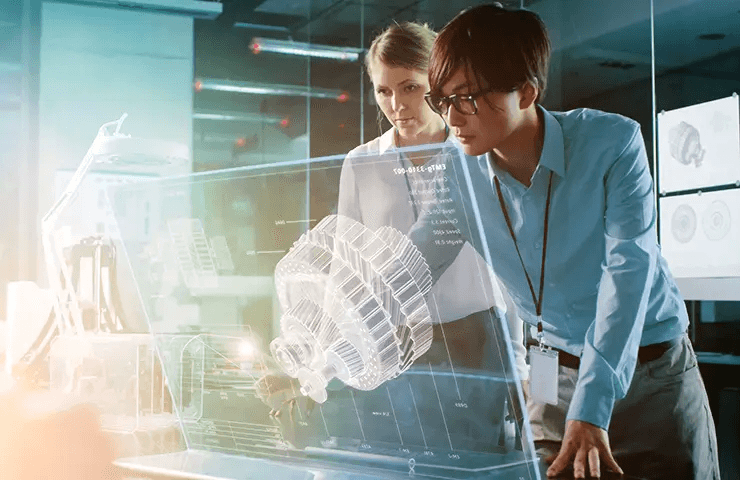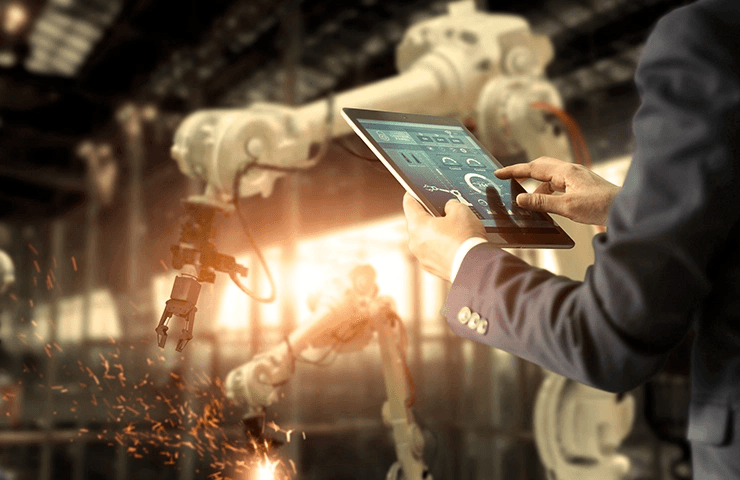
ERP systems have traditionally focused on operations: standardized business processes, a high degree of automation, greater transparency and a broader information base. However, modern ERP solutions have the potential to provide a comprehensive, fresh perspective on your company. Data is available that did not exist before, at least not in this structured form. However, generating insights and knowledge from this data can require a lot of effort: reports must be structured and kept up to date, and additional analysis tools may be necessary.
Why intelligent ERP systems have the edge
Intelligent ERP systems provide smart assistants that use business data to make predictions, suggest improvements and make recommendations. This enables users to avoid risks, reduce costs and organize processes more efficiently. Intelligent ERP (iERP) is not just an accidental breakthrough. With iERP, the software industry is responding to growing demand for solutions that support management, users and strategic business decisions. This is hardly possible with conventional ERP software. There are many reasons for this:
- Traditional ERP systems are based on manually defined rules. For example, orders are always triggered as soon as a certain level is reached. The problem is that such simple mechanisms cannot respond to short-term changes in the environment of dynamic markets.
- Lists are sorted according to historically established priorities and heuristics. They are frequently the sole basis for software-supported resource allocation in production planning. The problem: It is not possible to create a model for situations where there are competing objectives or for the process of weighing up several different options.
- The reliability of delivery date forecasts often depends on the experience of individual employees. The problem: With production at full capacity and complex dependencies, well-founded estimates are almost impossible and are therefore a matter of luck.
Intelligent assistants, on the other hand, accelerate operational decisions in forecasting and optimization, and do so with greater precision. AI-supported ERP systems therefore bring more security and reliability in planning processes.
More time to make the right decisions
Intelligence is a multifaceted concept. One of these assistants, Microsoft 365 Copilot, supports you in all situations: in daily routine tasks as well as in creative work on projects. The focus here is primarily on general assistance functions. Microsoft's agents go one step further: they are highly specialized AI-supported assistants that automate business processes and make them more efficient. Users continue to decide for themselves which solutions and suggestions are to be implemented. In other words, you retain full control over the entire process at all times.
An agent can support you in various tasks or even take them over completely. The agent slips into the role of a virtual project manager or carries out complex tasks such as reconciling financial reports. At the end, all you have to do is check the results and make decisions. The great thing about it is that it works around the clock and is always on hand to check returns or approve invoices, for example. This reduces the workload of employees and helps companies avoid costly mistakes in the supply chain. In on-site customer service, agents support technicians with product information, guide them through instructions and open tickets at the IT helpdesk.
Working with intelligent agents opens up an exciting new world for companies enabling them to optimize their team, drive their business forward and accomplish much, much more.
How intelligent assistants work
In technological terms, an intelligent assistant is a cloud service that provides recommendations for action based on mathematical models and information from the ERP system. A connector controls the exchange of data and ensures seamless interaction between the components. Results, key figures and forecasts are clearly presented on dashboards.
The framework outlined builds on the strengths of classic ERP systems: reliable data in a clearly defined context and standardized processes with clear objectives. The processes are important building blocks for mathematical models. The cloud and connector ensure that sufficient computing power is available and scalable to meet demand. In this way, the potential stumbling blocks of data science can be deftly avoided. Too often, the required IT resources are underestimated. Companies benefit from less complexity in terms of IT, lower costs and standardized mathematical models.
How iERP can help your company
- Increased efficiency through precise delivery dates and optimized resource planning.
- Lower costs: reduced IT complexity and investment needs.
- Competitive advantage: quick decisions and maximum reliability.
Experience the benefits of an intelligent ERP system! Contact us for a free consultation and find out how you can optimize your business processes.
Keywords
More similar blogposts:
Found what you were looking for?
Start your intelligent search now




